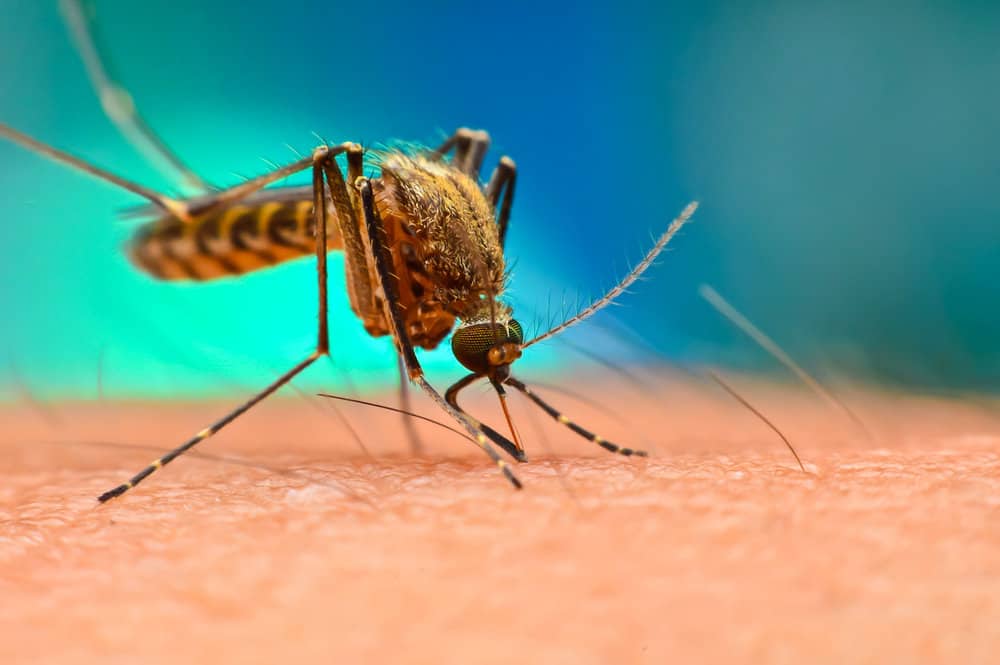
One evening an aspiring 40 year old nature photographer was brought to the ER. He was feeling ill with intermittent fever for several days. He had malaise, arthralgias, a headache, and episodes of delirium. No one else in the family was ill.
He was previously well. He was on no medications and had no allergies. He was up to date for all immunizations. A question about recent changes in his life revealed he had returned a couple weeks ago from a trip to the Serengeti National Park in Tanzania. While there, he had spent a lot of time in the field photographing animals. He didn’t bother using insect repellent on his outings, as he hates the smell of it and thought he was protected by the chemoprophylaxis he was taking.
A physical exam of the patient did not reveal any specific focus of infection but he was febrile, tachycardic, and pale. Routine lab work was completed as well as light microscopy of a giemsa stained blood smear to check for Plasmodium parasites.
This first blood smear was negative which is not unusual for malaria. A second blood smear was ordered for the following day and was positive, confirming the patient had contracted malaria.
Malaria is caused by the parasite carried by mosquitoes. There are four kinds of malaria parasites known to cause disease in humans: Plasmodium falciparum, P. vivax, P. ovale, and P. malariae
P. falciparum is the most deadly of these and is also the most common variety in sub-Saharan Africa. The incubation period is about 10-30 days, but some people have become symptomatic as early as one week after infection. Symptoms are classed as uncomplicated or severe.
Uncomplicated symptoms include intermittent paroxysms of fevers throughout the day, malaise, headaches, myalgias. Cough and GI symptoms can also occur.
Severe malaria can include altered mental status, severe weakness, seizures, severe anemia, hypoglycemia, jaundice, pulmonary edema, bleeding disorder, and shock.
Something we often don’t think about in the US is Malaria. But it is a disease that affects millions around the world. It is especially prevalent in sub-Saharan Africa. Tanzania, where this patient traveled, is one of the countries with a high risk for malaria. Most patients recover with treatment if administered early in the disease. If untreated, the disease can be fatal. Therefore, a high index of suspicion is needed for patients who have traveled to endemic countries in order to catch the disease early.
All travelers should take chemoprophylaxis for malaria if traveling to endemic countries. It is a good idea to consult a travel clinic if international travel is planned; however, remember that prophylaxis for malaria is not 100% effective. Mosquito bite prevention (sleep nets, clothing, insect repellant) is still critical. This disease should be considered in symptomatic patients who have traveled to endemic areas regardless of their prophylaxis efforts.
He was previously well. He was on no medications and had no allergies. He was up to date for all immunizations. A question about recent changes in his life revealed he had returned a couple weeks ago from a trip to the Serengeti National Park in Tanzania. While there, he had spent a lot of time in the field photographing animals. He didn’t bother using insect repellent on his outings, as he hates the smell of it and thought he was protected by the chemoprophylaxis he was taking.
A physical exam of the patient did not reveal any specific focus of infection but he was febrile, tachycardic, and pale. Routine lab work was completed as well as light microscopy of a giemsa stained blood smear to check for Plasmodium parasites.
This first blood smear was negative which is not unusual for malaria. A second blood smear was ordered for the following day and was positive, confirming the patient had contracted malaria.
Malaria is caused by the parasite carried by mosquitoes. There are four kinds of malaria parasites known to cause disease in humans: Plasmodium falciparum, P. vivax, P. ovale, and P. malariae
P. falciparum is the most deadly of these and is also the most common variety in sub-Saharan Africa. The incubation period is about 10-30 days, but some people have become symptomatic as early as one week after infection. Symptoms are classed as uncomplicated or severe.
Uncomplicated symptoms include intermittent paroxysms of fevers throughout the day, malaise, headaches, myalgias. Cough and GI symptoms can also occur.
Severe malaria can include altered mental status, severe weakness, seizures, severe anemia, hypoglycemia, jaundice, pulmonary edema, bleeding disorder, and shock.
Something we often don’t think about in the US is Malaria. But it is a disease that affects millions around the world. It is especially prevalent in sub-Saharan Africa. Tanzania, where this patient traveled, is one of the countries with a high risk for malaria. Most patients recover with treatment if administered early in the disease. If untreated, the disease can be fatal. Therefore, a high index of suspicion is needed for patients who have traveled to endemic countries in order to catch the disease early.
All travelers should take chemoprophylaxis for malaria if traveling to endemic countries. It is a good idea to consult a travel clinic if international travel is planned; however, remember that prophylaxis for malaria is not 100% effective. Mosquito bite prevention (sleep nets, clothing, insect repellant) is still critical. This disease should be considered in symptomatic patients who have traveled to endemic areas regardless of their prophylaxis efforts.


